Related Research Articles

Gateshead is a town in the Metropolitan Borough of Gateshead in Tyne and Wear, England. It is on the River Tyne's southern bank, opposite Newcastle to which it is joined by seven bridges. The town contains the Millennium Bridge, The Sage, and the Baltic Centre for Contemporary Art, and has on its outskirts the twenty metre tall Angel of the North sculpture.

The South London Theatre is a community theatre housed in a Grade II listed former fire station, in West Norwood in the London Borough of Lambeth, England. The first play opened in October 1967, and it is now a busy theatrical venue, presenting more than 22 shows annually in its theatre space, which was remodelled during refurbishment of the Old Fire Station during the period 2015–2018. The theatre facilities also consist of two dedicated rehearsal spaces, an entire floor of wardrobe rooms and a private basement bar, open Sunday to Friday evenings to audiences and members and which plays host to regular social events.

The Oregon Shakespeare Festival (OSF) was a regional repertory theatre in Ashland, Oregon, United States, founded in 1935 by Angus L. Bowmer. The Festival now offers matinee and evening performances of a wide range of classic and contemporary plays not limited to Shakespeare. During the Festival, between five and eleven plays are offered in daily rotation six days a week in its three theatres. It welcomed its millionth visitor in 1971, its 10-millionth in 2001, and its 20-millionth visitor in 2015. At any given time between five and eleven plays are offered in daily rotation six days a week in its three theatres.

Sage Gateshead is a concert venue and musical education centre in Gateshead on the south side of the River Tyne in North East England. Opened in 2004 and occupied by North Music Trust it is part of the Gateshead Quays development which includes the Baltic Centre for Contemporary Art and the Gateshead Millennium Bridge. Its name honors a patron: the accountancy software company The Sage Group.
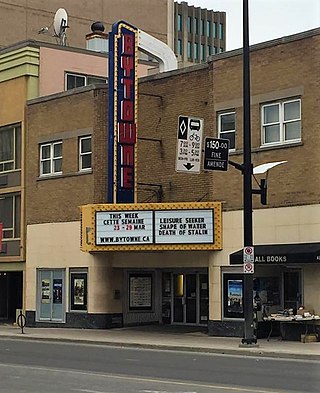
The ByTowne Cinema is a one-screen repertory movie theatre located in Ottawa, Ontario, The cinema is one of Ottawa's main venues for independent and foreign films. The 650-seat cinema is located on Rideau Street at Nelson, several blocks east of the Rideau Centre. It was closed on December 24, 2020, with a final week of screenings shown on February 26 to March 7, 2021. The cinema reopened under new ownership on September 8, 2021.
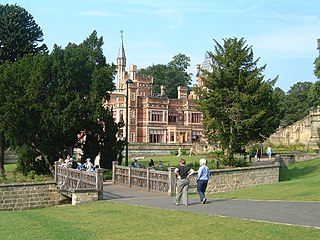
Saltwell Park is a Victorian park in Gateshead, Tyne and Wear, England. Opened in 1876, the park was designed by Edward Kemp and incorporates the mansion and associated grounds of the Saltwellgate estate owner, William Wailes, who sold his estate to Gateshead Council for £35,000. Upon opening, it became known as "The People's Park". The park was expanded in 1920 when the council purchased the adjacent gardens to the Saltwell Grove estate and added these to the park. This extended the park's total size to 55 acres (22 ha). Towards the end of the 20th century, the park had fallen into disrepair, but between 1999 and 2005, it was subject to a £9.6 million restoration project, funded collaboratively by the Heritage Lottery Fund and Gateshead Council and is now host to around 2 million visitors per year.

The New Theatre is one of the principal theatres of Cardiff, capital city of Wales. It is located in the city centre on Park Place, close to Cathays Park.

Low Fell is a suburb of Gateshead situated in the Metropolitan Borough of Gateshead in Tyne and Wear, England. Built predominantly on sandstone, grindstone and clay, it is bordered by Sheriff Hill/Deckham to the east, Saltwell/Bensham to the west, Harlow Green to the south and Shipcote to the north. Low Fell is 3 miles south of Gateshead, 3 miles south of Newcastle upon Tyne and 12 miles north Durham.
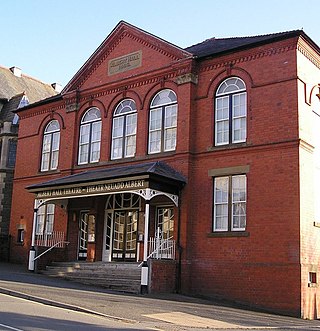
The Albert Hall is a period Victorian theatre in Llandrindod Wells in Powys, Wales. Originally built as a church hall in 1896, it became a theatre in 1922, with the addition of an art-deco foyer. The exterior of the building, foyer and auditorium remain to this day much as they were then.

Canberra Theatre Centre (CTC), also known as the Canberra Theatre, is the Australian Capital Territory’s central performing arts venue and Australia’s first performing arts centre, the first Australian Government initiated performing arts centre to be completed. It opened on 24 June 1965 with a gala performance by the Australian Ballet.

The Bonstelle Theatre is a theater and former synagogue owned by Wayne State University, located at 3424 Woodward Avenue in the Midtown Woodward Historic District of Detroit, Michigan. It was built in 1902 as the Temple Beth-El, and was listed on the National Register of Historic Places in 1982. As of 2023, the Bonstelle is planned to be renovated and integrated into a newly-constructed hotel.

The Arden School of Theatre, also known as The Arden, is a drama school which is part of the Performing Arts faculty at UCEN Manchester in England, United Kingdom.
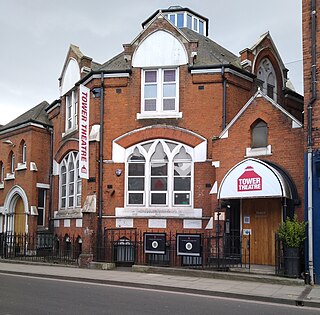
The Tower Theatre Company is a performing non-professional acting group based in a building in Northwold Road, Stoke Newington, having moved there in April 2018 from the St Bride Institute, in the City of London.

The Puppet Theatre Barge is a unique, fifty-seat marionette theatre on a converted barge in London. The theatre presents puppet shows for children and adults and is moored in Little Venice throughout the year and in Richmond-upon-Thames during the summer.
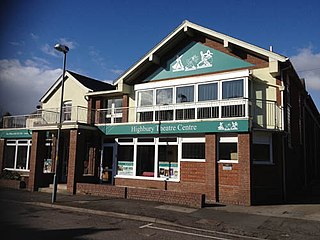
Highbury Theatre is a non-professional theatre situated in the Royal Town of Sutton Coldfield, Birmingham, England. It is one of the oldest, established amateur theatres in the city and a founding member of the Little Theatre Guild of Great Britain.

The Abbey Theatre is situated on Pool Bank Street in the Abbey Ward of Nuneaton, England, and is managed and run by volunteers by the Nuneaton Arts Council (NAC).

The Tank is a nonprofit off-off-Broadway performance venue and producer in Manhattan, New York. The organization was founded in May 2003 by a group of young artists and has since moved several times, residing on 36th Street as of 2017. The Tank presents art across several disciplines, produced at no fee for use of the venue to the presenting artists.
The Priory Theatre is an amateur theatre building and company located in Kenilworth, Warwickshire, England. There are 120 seats in a circle and stall layout.

The March 2021 United Kingdom budget, officially known as Protecting the Jobs and Livelihoods of the British People was a budget delivered by Rishi Sunak, the Chancellor of the Exchequer in March 2021. It was expected to be delivered in Autumn 2020, but was postponed because of the COVID-19 pandemic. It succeeds the budget held in March 2020, and the summer statement and Winter Economy Plan held in summer and autumn 2020, respectively. The budget is the second under Boris Johnson's government, also the second to be delivered by Sunak and the second since Britain's withdrawal from the European Union. The budget was the first for government expenditure in the United Kingdom to exceed £1 trillion.

The COVID-19 pandemic has had a significant impact on the performing arts, mirroring its impacts across all arts sectors. Due to physical distancing requirements and closure of the physical venues, curtailing not only public performances but also rehearsals, many performing arts institutions attempted to adapt by offering new digital services. In particular this resulted in the free online streaming of previously recorded performances of many companies – especially orchestral performances and plays – lists of which were collated by journalists as well as bespoke crowdsourcing projects.
References
- ↑ "Local People - Gateshead History". www.gatesheadhistory.com. Retrieved 11 October 2020.
- ↑ "History of the Progressive Players and the Little Theatre". Little Theatre Gateshead. Retrieved 4 July 2014.
- ↑ "Home Page - PP - ATP".
- ↑ "Little Theatre, big ideas".